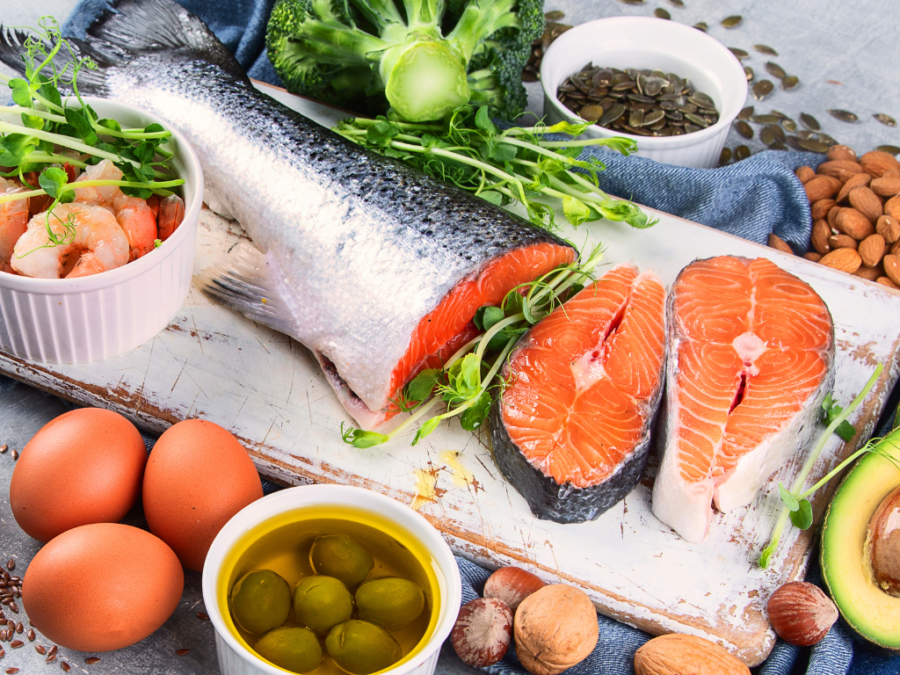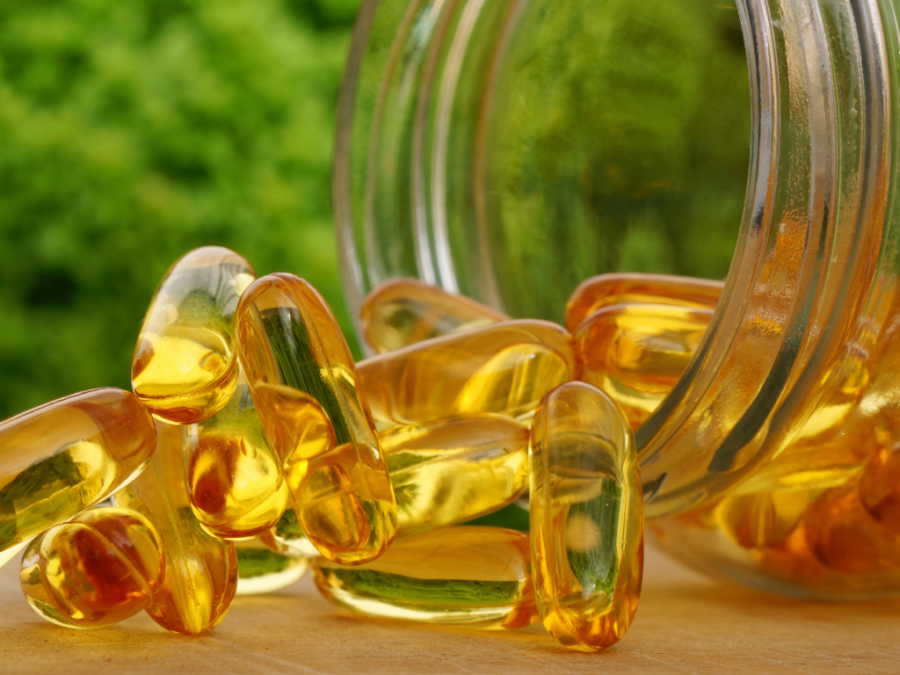DHA is an omega-3 fatty acid that’s essential for human health. It can be found in fish oils, enriched foods, formula milk, and supplements. This nutrient is particularly important for pregnant women and young kids because it helps with brain development. However, it can also be beneficial to women who aren’t pregnant, men, and the elderly. Thus, it can be a great addition to your household’s diet.
Advertisements often mention DHA as a beneficial addition to various products, such as infant formula and pregnancy milk. Given all this, is this nutrient really all it’s cracked up to be? Below, we’ll explore the benefits of omega-3 fatty acids and what it can do to ensure health in pregnant women, babies, and the whole family.
What are omega-3 fatty acids?

Docosahexaenoic acid (DHA) is an omega-3 fatty acid that is essential for human health. It can be found in fish oils and other marine sources, and it’s important for brain development and function. It supports cognitive function, memory formation, and learning ability. Additionally, it plays a role in maintaining heart health by reducing inflammation and more.
Omega-3 fatty acids are a type of polyunsaturated fatty acid that is essential for human health. They can help improve heart health and cognitive function, and they can also help facilitate joint pain relief. There are three major kinds of omega-3 fatty acids:
- Docosahexaenoic acid (DHA)
- Alpha-linolenic acid (ALA)
- Eicosapentaenoic acid (EPA)
Alpha-linolenic acid (ALA) is an essential fatty acid that the body cannot produce on its own, so it must be obtained through diet. ALA is found in plant-based foods such as nuts, seeds, and oils. It is important for maintaining heart health, preventing chronic diseases, and providing energy.
Some of the best sources of ALA include chia seeds, flaxseeds, walnuts, soybeans, and canola oil. These foods are all high in fiber and protein as well as other nutrients that are beneficial to overall health. Including a few servings of these foods each week can help ensure that you’re getting enough ALA to support your health goals.
Meanwhile, eicosapentaenoic acid (EPA) is a type of omega-3 fatty acid that has been found to have many health benefits. It can be found in foods such as salmon, tuna, and trout, and it’s often found in combination with DHA. EPA helps reduce triglyceride levels in the blood and can also help with pain reduction.
Additionally, it’s commonly used to help prevent heart attacks. It can even be helpful in preventing depression.
The body cannot produce significant amounts of omega-3 fatty acids, so they must be obtained through the diet. Fortunately, you can get these nutrients in a variety of ways. You can get one or a combination of these three fatty acids from different kinds of foods and dietary supplements, so you’ll be able to have a wide array of choices for how you get the nutrients you need.
Benefits of DHA

Over the years, studies have shown how omega-3 fatty acids can do a lot of good for developing fetuses, babies, and young children. However, it can also benefit women who aren’t pregnant and even men. Thus, it’s an important addition to just about anybody’s diet.
Pregnant women
DHA is an omega-3 fatty acid that is important for pregnant women and their unborn children. It helps ensure the proper development of a baby’s eyes, brain, and nervous system. It’s also possible that this nutrient will be able to help prevent preterm birth.
Omega-3 fatty acids can be found in fish oil supplements or in seafood. Pregnant women should make sure they are getting enough DHA every day to ensure a healthy pregnancy.
Young kids
DHA is important for brain development and cognitive function in children. It’s found in many infant formulas, and it’s also naturally found in breastmilk. Young babies are likely getting enough of this nutrient from breastmilk or formula but will need higher doses as they grow older.
Additionally, this nutrient has been shown to improve learning ability, memory, and problem-solving skills in children. It can also help protect against cognitive decline as they get older. In addition, it supports healthy vision and eye development in kids. So it’s important for kids to get plenty of this nutrient both during early childhood and throughout their lives.
Other possible benefits of omega-3 fatty acids for young kids include relief of asthma symptoms as well as improved sleep. While these nutrients is vital in early development, it can also benefit kids as they grow older.
Support your child’s brain development and help them improve their cognitive function even further with one-on-one math classes. With the right nutrition and educational support, your child can take on the challenges of the world with confidence. Sign up today and get a total of 59 math classes for free!
General uses
Mothers and their children aren’t the only ones who can benefit from DHA. In fact, the whole family will do well to include omega-3 nutrients in their diet. From the youngest babies to the oldest grandparents, omega-3 nutrients will benefit everyone in the household.
One of the most important omega-3 benefits is its positive impact on heart health. It helps to improve blood flow and reduce inflammation throughout the body. This can benefit you in a variety of wheel Additionally, studies have shown that it can help to lower bad cholesterol levels and blood pressure levels.
Sources of DHA
There are many benefits to getting enough DHA in your diet. Some of the most important include improved brain function, better vision, and a stronger immune system. But where do you get this nutrient, and what do you need to do to ensure that you’re getting enough of it?
Pregnancy milk and formula
DHA is an important nutrient for pregnant women and their developing fetuses. It’s found in recommended levels in breast milk and some infant formulas. It helps with brain development, eye health, and overall growth and health of the fetus.
Many pregnant women might not get enough of this nutrient from their diets, so it is important for them to get it from other sources, such as formula milk. Baby formula and milk for pregnant mothers often have the recommended amount of omega-3 nutrients, along with several other nutrients that can help fetal and child development. These include folic acid, choline, iron, and the like.
You can make sure that your growing baby and growing toddler get all the omega-3 nutrients they need for their development. With the help of Enfamama A+ and Enfagrow A+, you’ll get a wide range of nutrients in just one glass.
Sign up for the Enfamama A+ Club to get FREE Enfamama A+ and Enfagrow A+ samples. Enfamama and Enfagrow can help you stay healthy and provide your baby with the nutrients they need to grow strong.
Seafood
Seafood is a good source of DHA, and eating it regularly can help you stay healthy. Typically, seafood has a combination of DHA along with either EPA or ALA, or both. Thus, including at least 8 ounces of seafood in your diet can help provide you with the omega-3 fatty acids you need. If you’re pregnant, eating certain kinds of fish can help your baby’s development.
These are some of the different kinds of seafood that have DHA and other omega-3 fatty acids:
- Shrimp
- Oysters
- Seabass
- Mackerel
- Sardines
- Salmon
- Tuna
- Fish roe
- Tilapia
- Octopus
- Eel
- Clams
By including these options in your meals, you’ll be getting omega-3 fatty acids from natural sources. However, if you’re pregnant, it’s important to remember that you should avoid uncooked or undercooked seafood. You should also avoid king mackerel as well as other large, predatory ocean fish to prevent mercury exposure.
Pregnant women often have food aversions, especially in the early stages of pregnancy. For other reasons, it can be difficult to include sources of omega-3 fatty acids in your diet. Fortunately, there are other ways that you can ensure that you can get the nutrients you need during your pregnancy.
If you’re looking for vegetarian sources of DHA, algae and seaweed are great options. Things like nori and algae oil supplements don’t come from animal sources and can provide you with the nutrients you need.
Make sure that you and your baby are taken care of during and after your pregnancy. These freebies include a limited offer Tian Wei Signature Trial Confinement Meal and other products that will keep you and your baby healthy and happy.
Supplements
Pregnant women can also take prenatal DHA supplements. Omega-3 fatty acids are vital to the development of a fetus. They help ensure that the eyes, nervous system, and brain all develop properly.
If you’re pregnant, consult with your doctor to see if you need to take DHA supplements as well. You’ll likely be told to drink pregnancy milk and maintain a healthy diet, but your doctor may also want you to take dietary supplements to make sure that you and your baby get the vitamins and nutrients you both need.
However, if you’re not pregnant, there are also supplements that can help you ensure that you get the right amount of omega-3 fatty acids. It’s important to note that DHA-only supplements are typically made of fish oil, so if you’d rather have a supplement that isn’t derived from animals, there are also supplements made of algae oil.
You might be wondering if you still need supplements if foods with omega-3 vitamins feature heavily in your diet anyway. In general, simply eating food with omega-3 fatty acids may not be enough. This is why supplements can help you get the necessary amount of intake.

How much DHA do you need?
A combination of a healthy diet and supplements can ensure that you get all the omega-3 fatty acids you need. Many health organizations and professionals recommend an intake of 250 to 500 milligrams of DHA and other omega-3 fatty acids per day. However, others also recommend no more than 300 milligrams, with no more than 200 milligrams coming from supplements. You can consult your doctor to figure out the best amount of omega-3 fatty acids for you and the best way to get it.
One thing to think about is the amount of DHA that’s naturally present in food sources. Many of these foods don’t offer enough of this nutrient to satisfy the daily required intake. There are certain kinds of fish that offer more than the recommended amount, but may not be accessible to many.
You can check out which kinds of fish and shellfish are available to you and are safe for you to eat. You can then ask your doctor if you still need to supplement your diet.
For a wide variety of reasons, many mothers struggle to have a good and balanced diet that has all the nutrients they need to support their baby’s growth. This is where supplements and pregnancy milk come in. These can help ensure that you remain healthy throughout your pregnancy and that your baby develops into a strong and healthy child ready to take on the world.
Precautions when taking DHA
In general, DHA and other omega-3 fatty acids are safe to consume for pregnant women and children. However, it’s important to make sure that you and your child are consuming the appropriate amounts. Younger children typically need less omega-3 vitamins but will need more as they grow older. Ask your paediatrician what you can do to ensure that your child is getting enough vitamins.
For pregnant and lactating women

Prenatal DHA supplements and DHA-fortified milk are designed specifically for pregnancy and are therefore generally safe for pregnant women. Your OBGYN will likely recommend supplements that can help you ensure that you’re getting the daily recommended dose of this nutrient while you’re pregnant. If you’re currently breastfeeding, you can likely continue taking the same amount of DHA as you did while pregnant.
In general, pregnant and lactating mothers can take DHA supplements without any worries. Just make sure that you don’t take too much, and that you avoid uncooked seafood and certain types of fish to prevent mercury exposure.
For babies and young children
Breastmilk naturally contains DHA, and there are also infant formulas that contain the recommended amounts of this omega-3 vitamin. Thus, it’s unlikely that you’ll need to give babies omega-3 supplements. It’s an important nutrient during these early years of your child’s life, so it’s more than likely safe as long as you provide the right amounts.
For diabetics
It’s possible that DHA might raise blood sugar levels. If you have diabetes, make sure that you consult with your doctor first before taking DHA supplements. These supplements may also have an interaction with anti-diabetes drugs, and your dosage might need to be adjusted to accommodate your intake of this nutrient.
This is especially important to remember if you’re pregnant and have been diagnosed with gestational diabetes. If you’ve been prescribed medication like metformin, make sure that you speak with your OBGYN about taking supplements.
For vegans and vegetarians
Many of the sources of DHA and other omega-3 fatty acids are animal-based. If you intend to take supplements, make sure to check the label to see what the source of the supplement is. A lot of the supplements on the market are derived from fish oil, so it can be more difficult for vegans and vegetarians to find plant-based sources of this nutrient.
However, that doesn’t mean that it’s impossible. There are some plant-based DHA supplements on the market, likely derived from algae. These are vegan-safe and don’t contain fish oil. However, make sure that you still check the label to make sure that there are no animal-based ingredients.
Fortunately, there are many vegan sources of the two other omega-3 fatty acids, ALA and EPA. Some of the best sources include chia seeds, walnuts, brussels sprouts, hemp seed, perilla oil, and more. These foods contain omega-3 fatty acids and also provide other important nutrients like fiber and protein.
References
- https://ods.od.nih.gov/factsheets/Omega3FattyAcids-Consumer/
- https://lpi.oregonstate.edu/mic/other-nutrients/essential-fatty-acids
- https://www.webmd.com/vitamins/ai/ingredientmono-994/epa-eicosapentaenoic-acid
- https://www.ncbi.nlm.nih.gov/pmc/articles/PMC6316227/
- https://www.fda.gov/food/consumers/advice-about-eating-fish
- https://www.medicalnewstoday.com/articles/323144
- https://tools.myfooddata.com/nutrient-ranking-tool/DHA/All/Highest/Common/Simple/No
- https://www.medicalnewstoday.com/articles/prenatal-dha
- https://ods.od.nih.gov/factsheets/Omega3FattyAcids-HealthProfessional/
- https://www.webmd.com/heart/news/20090803/daily-omega-3s-recommended-heart
- https://www.verywellfamily.com/should-i-take-dha-supplements-when-im-breastfeeding-431987
- https://www.rxlist.com/docosahexaenoic_acid/supplements.htm







